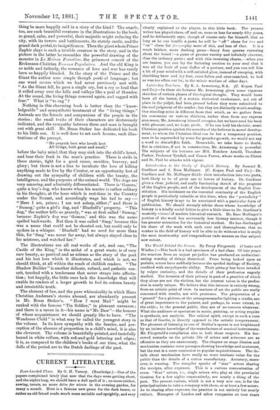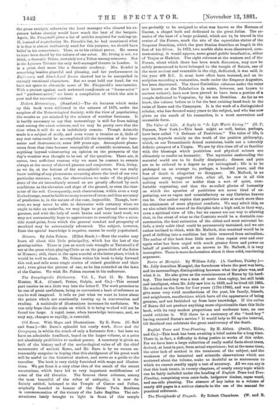The World Behind the Scenes. By Percy Fitzgerald. (Ghetto and
Winclus.)—This book is a bad specimen of a bad class. Of late years the reaction from an unjust prejudice has produced an undiscrimi- nating worship of things theatrical. From being looked upon as pariahs, actors have suddenly become the spoiled darlings of Society, credited with encyclopedic ability. Their privacy has been invaded by vulgar curiosity, and the details of their profession eagerly studied. The invasion of their privacy is part of a practice of which they alone are not the victims, but the interest taken in the profes- sion is nearly unique. We believe that this interest is entirely wrong, from an artistic point of view. In matters of art the public are really concerned with results, not with processes. The preparation of a "ground" for a picture, or the arrangements for lighting a studio, are of great importance to the painter, and perhaps, to some extent, to the critic ; to the general public, they are of no concern whatever. What the audience or spectators in music, painting, or acting require is synthesis, not analysis. The critical spirit, except in such a case as that of Goethe, is directly opposed to the artistic temperament. The pleasure of listening to one of 13erlioz's operas is not heightened by an intimate knowledge of the manufacture of musical instruments. Mr. Fitzgerald's compilation sins in both these respects. His bor- rowed remarks on the private life of actors and actresses are as offensive as they are unnecessary. The chapter on stage illusion and mechanism contains some passages showing knowledge and acuteness, but the rest is a mere concession to popular inquisitiveness. The de- tails about mechanism have really no more intrinsic value for the public than the details of a cotton manufactory. Accuracy, more- over, is wanting. The compiler speaks of "star" actors sharing the receipts, after expenses. This is a curious concentration of error. "Star" actors, i.e., single actors who play at the provincial theatres for a few nights consecutively, are nearly a thing of the past. The present custom, which is not a very new one, is for the principal artists to take a company with them, or at least a few actors. As to sharing after expenses, the practice is not entirely but nearly extinct. Managers of London and other companies on tour share the gross receipts, otherwise the local manager who cleared his ex- penses before shariug would have much the best of the bargain. Again, Mr. Fitzgerald gives a list of articles required for making.up. If, instead of reproducing Mr. French's list, he had mentioned what it is that is almost exclusively used for this purpose, we should have belief in his competence. Then, as to his critical power. He seems to have been dazed by the talents of one actor, Mr. Irving is not, we think, a dramatic Triton, certainly not a Triton among minnows. Nor is the Lyceum Theatre the only well-managed theatre in London. It is a great deal more like a dramatic academy. Mrs. Kendal is something besides graceful and pleasing, and her performances in Diplomacy and Black-Eyed Susan showed her to be unequalled in strongly emotional characters. But we must hold our hand, for lye have not space to chronicle more of Mr. Fitzgerald's inaccuracies. With a protest against such awkward comPounds as " lessee-actor " and "gardener-actor," we leave a compilation of which the aim is poor and the execution careless.



































 Previous page
Previous page